Last update:
Inflammatory disorders news
Arthritis & Rheumatism
Coexistence of psoriatic arthritis, atopic dermatitis may offer treatment insights
Psoriatic arthritis (PsA) and atopic dermatitis (AD) can coexist, and the presence of both conditions may mean special attention should be given to selecting optimal treatment, according to a study published online April ...
9 hours ago
0
8
Immunology
New study shows certain combinations of antiviral proteins are responsible for lupus symptoms
In a new study, researchers from Johns Hopkins Medicine say they have uncovered insights as to why lupus symptoms and severity present differently in individuals with the autoimmune condition, which affects up to 1.5 million ...
May 13, 2024
0
25
Could better inhalers help patients, and the planet?
Miguel Divo, a lung specialist at Brigham and Women's Hospital in Boston, sits in an exam room across from Joel Rubinstein, who has asthma. Rubinstein, a retired psychiatrist, is about to get a checkup and hear a surprising ...
May 10, 2024
0
1

Study reveals role of iron in allergic asthma and points to potential new therapies
New USC research shows that iron serves as a gas pedal driving certain immune cells that cause inflammation in the lungs during an allergic asthma attack—and blocking or limiting iron may reduce the severity of symptoms.
May 8, 2024
0
33
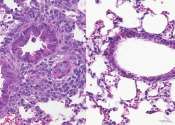
inflammatory protein research offers treatment strategies for a rare, potentially fatal lung disease
Most of the time, our immune systems do a great job defending against infection and keeping our bodies running smoothly. Sometimes, though, our immune system actually makes things worse. Case in point—researchers from Japan ...
May 8, 2024
0
4
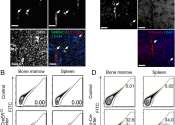
Tailored vaccine could one day treat eczema in children
New research from a multi-disciplinary team at Trinity College Dublin suggests a "tailored vaccine" might hold the key to treating bacteria-driven flares of eczema in children. The work has been published in JCI Insight.
May 8, 2024
0
1

Trifarotene plus skin care beneficial for acne vulgaris
Trifarotene plus skin care is beneficial for patients with moderate acne vulgaris (AV) and acne-induced hyperpigmentation (AIH), according to a study published online April 29 in the International Journal of Dermatology.
May 8, 2024
0
0

Yes, adults can develop food allergies—here are four types you need to know about
If you didn't have food allergies as a child, is it possible to develop them as an adult? The short answer is yes. But the reasons why are much more complicated.
May 8, 2024
0
2

Systemic antibiotics in first year of life tied to higher atopic dermatitis risk
Systemic antibiotic exposure in the first year of life is associated with higher atopic dermatitis (AD) risk in a dose-response fashion, according to a study published online April 24 in the Journal of Allergy and Clinical ...
May 8, 2024
0
0

Researchers discover compounds produced by gut bacteria that can treat inflammation
Researchers at the University of Toronto have found naturally occurring compounds in the gut that can be harnessed to reduce inflammation and other symptoms of digestive issues. This can be achieved by binding the compounds ...
May 3, 2024
0
65
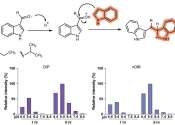
Study pinpoints cell that helps liver heal
A type of cell responsible for repairing damaged liver tissue has been uncovered for the first time by scientists.
May 2, 2024
0
24

Mapping a way to identify neighborhoods with a high risk of severe child asthma
An index of neighborhood environmental and social conditions can help to predict the risk of severe asthma among children at the hyperlocal level, according to a study led by Emily Skeen, MD, a University of Colorado School ...
May 1, 2024
0
0

Gene expression analyses identify potential drivers of chronic allergic inflammation
Currently, most therapies for allergic diseases require lifelong treatment. Allergic reactions, characterized by ongoing (type 2) inflammation in response to chronic antigen exposure, underlie many chronic diseases in humans, ...
Apr 30, 2024
0
9
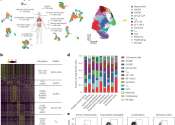
Protein responsible for genetic inflammatory disease identified
A team of researchers led by Dr. Hirotsugu Oda at the University of Cologne's CECAD Cluster of Excellence for Aging Research has discovered the role a specific protein complex plays in certain forms of immune dysregulation. ...
Apr 29, 2024
0
18
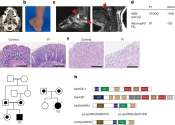
Tobacco smoking reduces the odds of psoriasis improvement, study finds
Tobacco smoking is negatively associated with resolution of psoriasis symptoms, according to a study published in the April issue of Tobacco Induced Diseases.
Apr 25, 2024
0
0

Atopic dermatitis found to negatively impact mental health
Atopic dermatitis (AD) negatively impacts patients' mental health (MH), especially when a patient has severe AD, according to a study published online March 14 in Dermatitis.
Apr 23, 2024
0
10

PET scans uncover smoldering inflammation in MS patients
A new study from Brigham and Women's Hospital suggests that positron emission tomography (PET) brain scans could reveal hidden inflammation in patients with multiple sclerosis (MS) who are being treated with highly-effective ...
Apr 23, 2024
0
2

Chemical pollutants can change your skin bacteria and increase your eczema risk—new research explores how
"We haven't had a full night's sleep since our son was born eight years ago," said Mrs. B, pointing to her son's dry, red and itchy skin.
Apr 23, 2024
0
40

Scientists discover the cellular functions of a family of proteins integral to inflammatory diseases
In a scientific breakthrough, Mount Sinai researchers have revealed the biological mechanisms by which a family of proteins known as histone deacetylases (HDACs) activate immune system cells linked to inflammatory bowel disease ...
Apr 22, 2024
0
22

Researchers identify connection between air pollutants and allergic diseases
A study by researchers at National Jewish Health published in the Annals of Allergy, Asthma & Immunology reports that air pollutants—including particulate matter, pollen, greenhouse gases, and other harmful substances—can ...
Apr 22, 2024
0
0




















